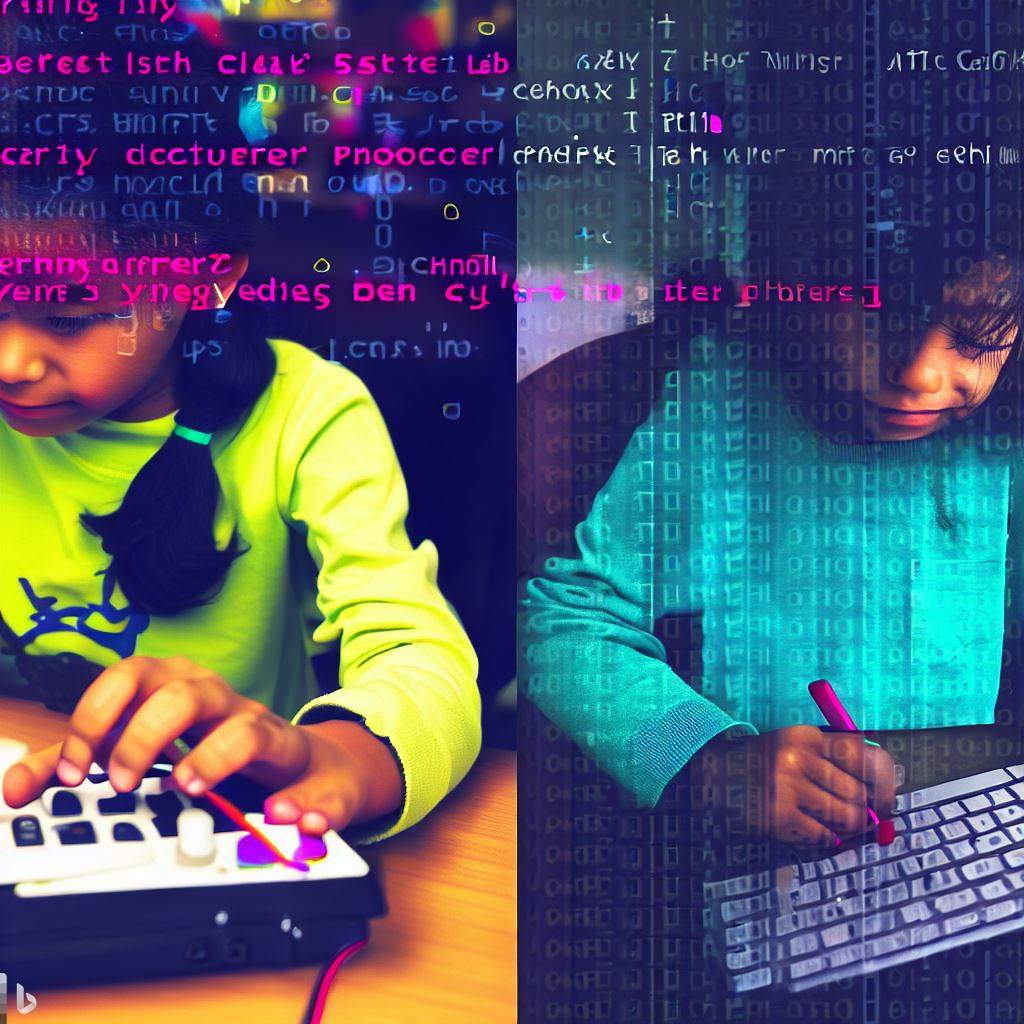Introduction
Coding games for kids have become increasingly popular in recent years, as they offer a fun and interactive way for children to learn coding games to improve kids’ logical skills.
Coding games can improve kids’ logical thinking by challenging problem-solving, critical thinking, and algorithmic skills.
Logical thinking skills are essential for child development as they enable children to solve problems, make decisions, and think critically.
Briefly Introduce the Topic:
- Welcome to the world of coding games for kids.
- Coding is more than computer science; it’s about nurturing logical thinking.
- Let’s explore how coding games benefit children.
Explain the Importance of Logical Thinking Skills
- Logical thinking is the foundation of problem-solving.
- It helps kids analyze, plan, and make informed decisions.
- Through coding games, children develop critical reasoning abilities.
- These skills extend beyond screens, improving academics and life.
- Logical thinking enhances creativity and innovation.
- It prepares kids for future careers in technology and beyond.
- Coding games make learning enjoyable, fostering persistence and resilience.
- Kids learn to break complex problems into manageable steps.
- Mistakes become opportunities to learn and refine solutions.
- Logical thinking instills confidence, empowering children in every facet of life.
In the digital age, teaching kids to code isn’t just about preparing them for technical careers; it’s about equipping them with essential life skills.
By embracing coding games, parents and educators can nurture logical thinking, setting the stage for success in an ever-evolving world.
What are coding games?
Coding games are interactive programs that teach kids the basics of coding in a fun and engaging way. They are designed to develop logical thinking, problem-solving skills, and creativity.
- Code.org: This platform offers a wide range of coding games and activities suitable for kids of all ages. It features popular themes like Minecraft and Star Wars, making it engaging and exciting for children.
- Scratch: Developed by MIT, Scratch is a visual programming language that allows kids to create interactive stories, games, and animations. It has a simple drag-and-drop interface, making it perfect for beginners.
- Tynker: Tynker offers coding games that introduce kids to coding concepts through puzzles, quizzes, and challenges. It covers various programming languages, including Python and JavaScript, and provides a structured learning path.
- Lightbot: Lightbot is a puzzle game that teaches kids programming logic by guiding a robot through a series of challenges. It starts with basic commands and progressively introduces more advanced concepts.
- Kodable: Kodable is an educational game that teaches coding to kids as young as 4 years old. It uses a simple visual interface and storytelling to introduce coding concepts and problem-solving skills.
Coding games provide a hands-on approach to learning, allowing kids to experiment with different coding concepts.
By solving puzzles, completing tasks, and overcoming challenges, kids develop critical thinking and problem-solving skills necessary for coding.
These games also promote creativity as kids have the freedom to create their own stories, games, and animations.
Moreover, coding games improve logical thinking by introducing kids to programming logic, sequences, loops, and conditional statements.
With popular examples like Code.org, Scratch, Tynker, Lightbot, and Kodable, coding games offer a fun and engaging way for kids to learn coding.
Read: Getting Started with JavaScript: Best Coding Games
The link between coding games and logical thinking skills
Explaining how coding games require logical thinking
In today’s digital age, coding games have become increasingly popular among kids. These games not only provide entertainment but also offer numerous cognitive benefits, especially in terms of logical thinking skills.
When kids engage in coding games, they must follow a set of instructions and commands to achieve a desired outcome.
Tech Consulting Tailored to Your Coding Journey
Get expert guidance in coding with a personalized consultation. Receive unique, actionable insights delivered in 1-3 business days.
Get StartedThis requires them to think logically, plan their actions, and make decisions based on specific rules and conditions.
Coding games often involve problem-solving tasks that require kids to analyze a situation, break it down into smaller components, and come up with a solution.
They learn to identify patterns, anticipate potential outcomes, and adjust their strategies accordingly.
These processes involve logical reasoning and critical thinking, which are essential skills for solving complex problems in various aspects of life.
Discussing the cognitive benefits of playing coding games for kids
Playing coding games can have a profound impact on a child’s cognitive development. Here are some of the key benefits:
1. Enhancing problem-solving skills
Coding games require kids to think critically and systematically approach problems. They learn to break down complex tasks into simpler steps, identify the key issues, and find innovative solutions.
This fosters their ability to solve problems effectively, whether they encounter them while coding or in other real-life situations.
2. Developing critical thinking abilities
By engaging in coding games, kids develop their critical thinking skills. They learn to analyze situations from different perspectives, evaluate information, and make informed decisions.
These skills are crucial for logical reasoning, analyzing data, and making sound judgments in various academic and professional settings.
3. Fostering creativity and innovation
Coding games promote creativity and innovation among kids. When programming characters or designing game mechanics, kids have the freedom to experiment and explore different possibilities.
This encourages them to think outside the box, come up with unique ideas, and solve problems in unconventional ways.
These experiences not only enhance their logical thinking skills but also nurture their creativity and imagination.
Overall, coding games play a significant role in developing kids’ logical thinking skills.
By engaging in these games, children learn to think critically, solve problems systematically, and approach challenges with creativity and innovation.
Build Your Vision, Perfectly Tailored
Get a custom-built website or application that matches your vision and needs. Stand out from the crowd with a solution designed just for you—professional, scalable, and seamless.
Get StartedThe cognitive benefits of playing coding games extend far beyond coding itself, empowering kids to excel in various academic and real-life endeavors.
Read: The Fusion of Gaming and Programming: Future of Coding Wars

How coding games improve kids’ logical thinking
Breaking down the components of logical thinking improved by coding games
Coding games have proven to be an excellent tool for improving children’s logical thinking skills.
While playing these games, kids develop a range of cognitive abilities that are essential for problem-solving and critical thinking.
Let’s delve into the specific components of logical thinking that are enhanced by coding games.
1. Sequencing and planning
One fundamental aspect of logical thinking that coding games help develop is sequencing and planning.
Kids learn how to break down complex tasks into smaller, more manageable steps. They understand that each step must be in the right order to achieve the desired outcome.
For example, in a coding game where the goal is to guide a character through a maze, children must plan each move and anticipate potential obstacles.
This process encourages them to think logically and strategically.
2. Pattern recognition and analysis
Pattern recognition and analysis are crucial skills for logical thinking, and coding games provide an excellent platform for honing these abilities.
Through repetitive coding challenges, kids train their minds to recognize patterns in data and identify trends or regularities.
For instance, in a coding game that requires arranging a sequence of numbers, children must observe the pattern and apply it correctly to solve the puzzle. This exercise enhances their logical reasoning and analytical skills.
3. Algorithmic thinking and logical reasoning
Coding games encourage algorithmic thinking, which involves creating a series of logical steps to solve a problem.
By working through various coding puzzles, kids learn to think systematically and develop algorithms that yield desired outcomes.
Optimize Your Profile, Get Noticed
Make your resume and LinkedIn stand out to employers with a profile that highlights your technical skills and project experience. Elevate your career with a polished and professional presence.
Get NoticedImagine a coding game centered around creating a virtual pet. Kids must define the rules and behaviors of the pet, considering different scenarios and possible interactions.
Such games promote logical reasoning and enable children to approach challenges with a structured mindset.
4. Debugging and troubleshooting skills
Debugging and troubleshooting are vital components of logical thinking that coding games greatly enhance.
When faced with errors or bugs in their code, children must analyze the issue, identify the source of the problem, and devise a solution.
In coding games where kids build and modify virtual worlds, they encounter challenges that require debugging. By figuring out and correcting coding errors, children exercise critical thinking, perseverance, and problem-solving skills.
Providing specific examples and scenarios from coding games
To illustrate how coding games improve kids’ logical thinking, let’s examine some specific examples:
In a game like “CodeCombat,” children control characters by writing code. They must analyze the situation, plan the character’s actions, and debug their code to overcome obstacles.
This game fosters sequencing, planning, algorithmic thinking, and debugging skills.
Another coding game, “Scratch,” enables kids to create animations, games, and interactive stories by coding.
Through this game, children learn to identify patterns, apply logical reasoning, and analyze cause-and-effect relationships in their projects.
“Robot Turtles” is a board game that teaches young kids programming concepts without a computer.
By taking simple actions like moving forward or turning, children learn sequential thinking, pattern recognition, and algorithmic logic.
By engaging in these coding games and many others, kids gradually develop and enhance their logical thinking skills.
Through hands-on experiences and interactive gameplay, they become better problem solvers, critical thinkers, and logical reasoners.
Read: The Benefits of Gamified Learning in Programming
Additional advantages of coding games for kids
Coding games for kids offer numerous additional advantages. They actively engage young minds, fostering problem-solving skills.
These games also encourage creativity and imagination. Moreover, coding games boost kids’ confidence in technology-related tasks.
In addition to enhancing logical thinking, coding games improve concentration and attention to detail.
They develop perseverance, as kids learn to troubleshoot and debug. Furthermore, these games promote teamwork and collaboration.
Coding games facilitate the development of computational thinking, a crucial skill in today’s digital age. They teach kids to break complex problems into manageable parts.
Additionally, coding games enhance students’ ability to plan and organize.
These games provide an early introduction to programming concepts, laying a strong foundation for future learning.
They make learning fun and interactive, increasing children’s enthusiasm for technology and STEM subjects.
Furthermore, coding games offer instant feedback, helping kids learn from their mistakes. They empower kids to be creators and problem solvers, not just consumers of technology.
Overall, coding games for kids provide a holistic approach to skill development, preparing them for the future.”
Read: Interactive Experiences: Best Coding Wars Challenges Reviewed
Tips for parents and educators to maximize the benefits
Selecting appropriate coding games based on age and skill level
- Understand the age and skill level of the child to choose suitable coding games.
- Look for games that offer a gradual increase in difficulty to challenge the child.
- Consider games that provide different levels or stages, allowing for progress and growth.
- Research reviews and recommendations from other parents or educators to find quality games.
- Keep in mind the child’s interests and preferences to keep them engaged and motivated.
Encouraging frequent gameplay and practice
- Set a specific schedule or routine for coding game sessions to make it a regular habit.
- Monitor the child’s progress and encourage them to spend dedicated time practicing coding.
- Praise and reward the child’s efforts to motivate them to continue playing and improving.
- Engage in conversations about the game and discuss the concepts and strategies they learn.
- Create a supportive environment where the child feels comfortable to ask questions and seek help.
Balancing screen time with other activities
- Set limits on screen time and ensure the child has a healthy balance between online and offline activities.
- Promote physical activities, social interactions, and other hobbies to avoid excessive reliance on screens.
- Encourage outdoor play, reading, arts and crafts, and other creative and educational activities.
- Monitor and regulate the amount of time spent on coding games to prevent addiction or neglect of other responsibilities.
- Use coding games as a reward or incentive for completing other tasks or chores.
Supplementing with offline programming and logic puzzles
- Introduce offline programming activities like board games or physical coding kits.
- Provide logic puzzles, riddles, and brain teasers that promote critical thinking skills.
- Encourage the child to engage in problem-solving activities without relying solely on digital platforms.
- Combine online and offline exercises to develop a well-rounded set of logical thinking skills.
- Offer a variety of resources to stimulate creativity and enhance the child’s overall cognitive abilities.
Conclusion
Logical thinking is crucial in various aspects of life and should be cultivated.
Coding games are valuable tools for kids to develop and enhance their logical thinking skills.
Parents and educators should introduce coding games to their children or students to promote logical thinking.
Recap the Importance of Logical Thinking:
- Logical thinking is crucial for problem-solving.
- It aids decision-making, fostering independence.
- Essential in academics, career, and daily life.
- Fuels creativity and innovation.
- Builds resilience and confidence.
Emphasize the Value of Coding Games
- Coding games train logical thinking.
- Kids learn to analyze, plan, and adapt.
- Complex problems become manageable.
- Mistakes turn into opportunities to learn.
- Coding sparks creativity and computational skills.
Encourage Parents and Educators:
- Introduce coding games to children.
- Foster a love for logical thinking.
- Equip them for a tech-driven future.
- Resources abound, making learning fun.
- Together, let’s empower future problem-solvers.




